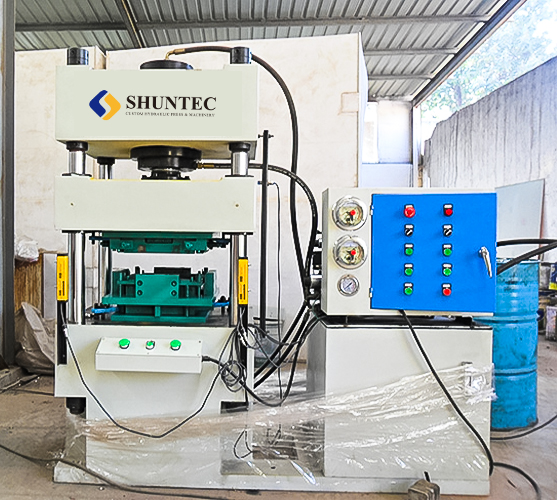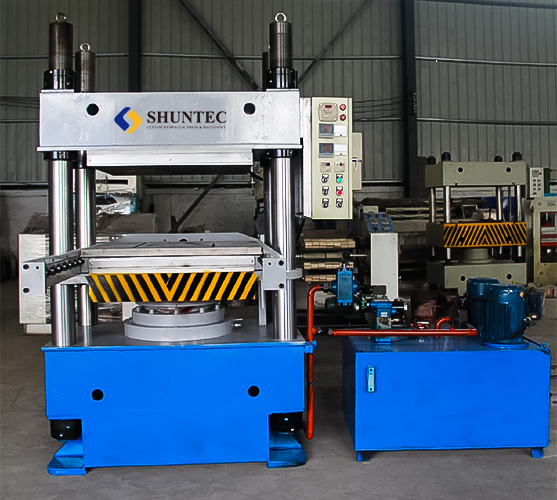Introduction
Hydraulic machines, a common sight in many industrial and commercial applications, are frequently referred to as “force multipliers.” But why is this term used, and what exactly does it mean? The answer lies in the fundamental principles of hydraulics and the physical laws governing these systems. This article aims to demystify these complex yet fascinating machines, exploring the principles that enable them to amplify force and deliver incredible power.



Understanding Hydraulics
Hydraulics is a branch of science concerned with the practical applications of fluids, particularly their motion and force. Hydraulic systems, which are integral parts of various machinery, use an incompressible liquid, often oil, to transmit force from one point to another.
Key components of a typical hydraulic system include:
- Reservoir: This is where the hydraulic fluid is stored. It also helps to separate air and any impurities from the fluid.
- Pump: It provides the energy needed to move the fluid in the system.
- Valves: They control the direction and flow of hydraulic fluid.
- Fluids: Incompressible fluids transmit power in the system.
- Actuators: These are devices like cylinders and motors that convert hydraulic energy into mechanical energy.
The Principle of Force Multiplication
Central to the notion of force multiplication is Pascal’s Law. Blaise Pascal, a French physicist and mathematician, discovered that pressure applied to an enclosed fluid is transmitted undiminished to all portions of the fluid and to the walls of its container. This law is often expressed mathematically as P = F/A, where P is the pressure, F is the force, and A is the area over which the force is applied.
This principle allows for force multiplication. In a hydraulic system, if you apply a small force over a small area, it gets transmitted through the hydraulic fluid and acts over a larger area, thereby creating a larger force. The force is “multiplied” according to the ratio of the two areas.

Hydraulic Machines as Force Multipliers
Hydraulic machines leverage the principle of force multiplication to perform heavy-duty tasks that would otherwise require enormous manual force. Below are some examples:
- Hydraulic Press: In a hydraulic press, a small force is applied on a small piston. This force is transmitted to a larger piston through hydraulic fluid, thereby producing a larger force at the larger piston. This enables the machine to bend or shape heavy metal pieces with relative ease.
- Hydraulic Brakes: In vehicles, when the brake pedal (attached to a small piston) is pressed, it exerts a force on the hydraulic fluid. This force is transmitted to the larger pistons at the wheel cylinders, causing the brake shoes to engage and stop the vehicle.
- Hydraulic Jacks: A small force is applied to a small piston in a hydraulic jack, which is then multiplied at the larger piston, enabling it to lift heavy loads.
Advantages of Force Multiplication in Hydraulic Machines
Force multiplication in hydraulic machines offers numerous advantages:
- Increased Efficiency and Power: Hydraulic machines, by virtue of force multiplication, can perform tasks requiring high force and power with relative ease.
- Energy Conservation: These machines help conserve energy by reducing the amount of physical force needed to accomplish tasks.
- Lower Operational Efforts: Tasks that would require significant manual force or multiple operators can be accomplished by a single operator using a hydraulic machine.
Applications of Hydraulic Force Multipliers
The principle of force multiplication through hydraulics has a broad range of applications:
- Industrial Applications: Hydraulic machines are extensively used in industries for bending, pressing, or stamping metal, plastic molding, and more.
- Automotive Applications: Vehicles extensively use hydraulic systems in braking, power steering, and suspension systems.
- Aerospace Applications: The aerospace industry uses hydraulic systems for controlling aircraft components like landing gear, flaps, and brakes.
- Construction Applications: In the construction industry, hydraulic machinery like excavators, cranes, and loaders are indispensable for heavy lifting and earth-moving tasks.

Potential Drawbacks and Risks
While hydraulic machines offer significant advantages, they also present potential risks and drawbacks:
- Maintenance: Hydraulic systems require regular maintenance to prevent leaks, which can lead to decreased efficiency or failure.
- Environmental Risks: Hydraulic fluid leaks can pose environmental hazards.
- Safety Concerns: Misuse or failure of hydraulic machinery can lead to accidents and injuries.
Conclusion
From the smallest hydraulic jacks to the largest construction machinery, the principle of force multiplication in hydraulic machines has revolutionized many aspects of our lives. By leveraging the power of Pascal’s Law, these machines have drastically increased our capacity to perform tasks requiring high force and power, conserving energy and reducing operational efforts along the way. However, with great power comes great responsibility. It is crucial to maintain these systems properly to prevent any potential risks and to continue enjoying their benefits.
